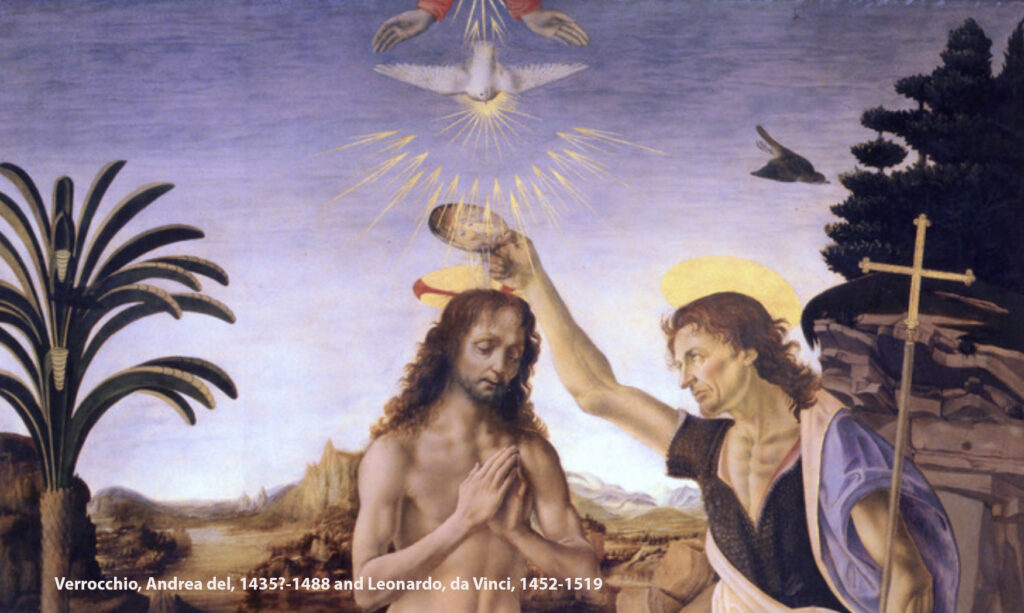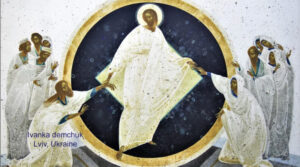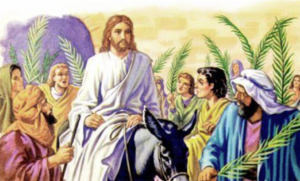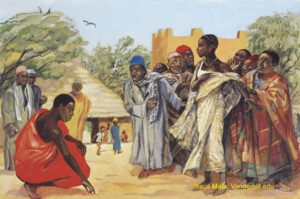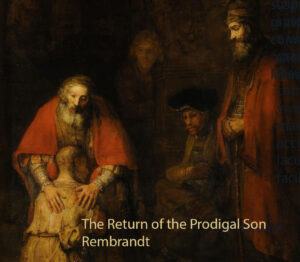The Baptism of the Lord - Lectionary: 21. Our part in making the kingdom of God be at hand
Reading I
Thus says the LORD:
Here is my servant whom I uphold, my chosen one with whom I am pleased, upon whom I have put my spirit. Isaiah 42:1
Responsorial Psalm
How manifold are your works, O LORD!
In wisdom you have wrought them all–the earth is full of your creatures; the sea also, great and wide, in which are schools without number of living things both small and great.
If you take away their breath, they perish and return to the dust.
When you send forth your spirit, they are created, and you renew the face of the earth. Psalm 104: 24-25; 29-30
How strange it seems to me when I hear readings like these which imply that God is not interested in raising up one single individual to “fix” the external situations in which humanity finds itself. The Isaiah passage may refer to only one “chosen one,” but could it be that God wants this to be true of every one of us? Might God have created each of us, wanting to say to every one of us, “Here is my servant whom I uphold, my chosen one with whom I am pleased, upon whom I have put my spirit.”?
I suspect that many of us pray a lot of our prayers and interpret the Scriptures as stories about people with more gifts and potential than those meager gifts we think we possess. We long for peace on earth and equality, but can’t see ourselves as able to do much about it. We prefer to do our small things as well as we can and trust that others will do likewise, and maybe God will do any fixing by Himself, ehnever He sees fitting to do so.
Might it be that God has a different plan for how that will happen, a plan that includes us, a plan for which God already has equipped us with the inner “tools” (intellect, will and interior warning systems [our feelings, emotions and other psychological triggers])? Perhaps if we used these inner tools wisely, others would do likewise. And together we could come closer to living in a world in which we humans are working together with God to make it the world where God is its and our King.
Gospel
“The people were filled with expectation,
and all were asking in their hearts
whether John might be the Christ. . . . Then, after all the people had been baptized
and Jesus also had been baptized and was praying,
heaven was opened and the Holy Spirit descended upon him
in bodily form like a dove.
And a voice came from heaven,
‘You are my beloved Son;
with you I am well pleased.’” Luke 3:15, 21-22
The people in this Lucan Gospel passage, as the Israelites before them, probably are looking for a “he who is to come” who will be another Moses or a “Christ,” one who will lead them to the life of their dream-come-true Israel, one that will free them from Roman rule. Instead, God arrived as gentle, nonviolent Son of God, “in whom God is well pleased.”
WHAT TO LOOK FOR IN THE UPCOMING READINGS
In the Gospel stories we will be hearing at Mass in the weeks ahead we shall see that this beloved Son is not going to spend his earthly days telling his disciples to change the externals of the world and the people around them. He is asking them (and us) to turn our minds, hearts and efforts toward becoming, with the guidance of the Spirit, true sons and daughters of God – in whom God can be “well pleased.” Jesus, growing from a tiny infant into a fully Father-centered adult, shows that his mission was to bring us to see that we, you and I, with the guidance and help of God and others, are meant, likewise, assist in the transformation of ourselves into “daughter and son with whom God can be well pleased.”
How do we do this? First by making sure that this is our top priority, that which means the most to us and that we focus much of our time, attention and money on achiving. Are we choosing this over every other person and thing that we could choose? This rather than wealth, prosperity, comfort, pleasure, security or power, not even peace, joy, love, happiness or fulfillment? These, or a change in our attitude toward them, only will come when we choose to seek the greatest good. Why? Because a longing for it has been implanted deep within us by our Creator, our most genuine lover: our God. Have you come to sense something, from time to time, deep inside of you? How did it get there and why is it there? It is only when we surrender to this that God will say of us, “This is my beloved daughter/son with whom I am well pleased.”
BECOMING THE REAL YOU
First, you and I must take a hard look at ourselves, then, if we are serious about this, we will develop plans that will enable us to pursue this, and, of course, day in and day out, follow it, evaluate our fidelity to it and revise it as needed.
Some suggestions:
THE IMPORTANCE OF BEING SELF-CONSCIOUS
It is not a bad thing to be aware that we are longing for something more than we are now, something more than we have now. That longing is a God-implanted tendency, one of the many GPS-like human nature’s mechanisms intended to encourage us to stop, take a deep and critical look at who we are and what we are thinking and doing. Why would God instill such a tendency n us if not so that we can cooperate with it and utilize it as a call for us to connect or reconnect with the Jesus-sent rescuing Spirit and see if we have lost our way, so that we can recalculate and realign our thoughts and actions with what we know we should believe.
Listen to this video of Jordan Peterson, Bishop Robert Barron and Father Mike Schmitz speaking about this.
(Note: Begin the video at time 00:45:28 to hear the section related to these points, but the whole video is worth watching.)
ONE LAST OBSERVATION
What saddens me the most about our world today, is that, after God went above and beyond and became one of us to show us how to reach our full potential (and live joyously while doing it), why are so few of us “getting it” and then witnessing it to others – even after the life, Passion, Death and Resurrection of the Son of God? It seems as if we are still looking for someone else to fix the externals. Before Jesus ascended into heaven, he told us, every one of us to do it. How? I think he means by our connecting to the Father, Son and Holy Spirit, letting this God do as he did in Jesus, heal and fix things that need fixing – and doing it by first, letting God fix us so that, like Jesus, Through us, God can connect and heal all things that need healing. What a wonderful world this could be if only we would come to know and love the true Jesus, see that we, you and I, individually and as a band of his disciples, are his mission, and become with each passing day more like the person he, with the Father and the Spirit, made us to become during our lifetimes.
Let us promise to ponder all of this now and for the rest of this Liturgical Year, letting God’s Spirit and Jesus’ words and actions lead us to using the days ahead, every one of them, so that at the end of our earthly life, God will say, “This is my beloved son/daughter with whom I am well pleased.”
And, if you need some guidance in structuring your days, consider looking at the pages of the three links at the top of this page: Becoming the real you, Preparation and Path.
Sister Loretta
WHO IS JESUS IN JORDAN PETERSON’S WORDS
In the below portion of this same video we hear Dr. Peterson’s understand of the Christ of the Bible and his teachings.. I have summarized his current understanding here:
- Christ claimed essentially is that he was the incarnation of the prophet and the laws and that makes that that’s a very specific sort of claim.
- Christ claimed that true kingship was embodied in the law and the prophets.
- Prophets are the manifestation of the spirit that generates the law.
- The law is something that has to be extracted from tradition.
- And the combination of those two things would be an even more transcendent spirit.
- And then you can be guided by that spirit, which is what you would do if you were a follower of The Law.
- And then you can do what Christ told the Pharisees to do, which would be to embody more than merely the dogma, but also the Spirit. And then you canopen yourself up so that that Spirit possessed you fully.
These Discussion Comments are statements that were made by participants in a small study group.
Discussion Comments: Law: It seems to be sort of like traffic laws. Someone(s) first put in writing what they think makes sense based upon their knowledge and experience of driving in that locale, i.e., based upon the “tradition.” It is the same for an operations manual of a corporation and a Constitution of a Religious Community.
Prophets: They understand the reasons for the law, see the intrinsic value of the law, comprehend the depth of the inner value and purpose of the Law, the Spirit of the Law. They strive to live it and proclaim it.
Jesus, in saying that he is the “incarnation of the law and the prophets, may mean that he fully comprehends God’s law and its Spirit, and fully proclaims it. That is pretty much what we would refer to as the King of kings.
Discussion Comments:
I think that this is sort of an incomplete answer. There are at least two phases of the God-become-man’s mission. One is to remove the guilt and, possibly, to assure us that future guilt, plus sin and its consequences, likewise will go away. But there is also a lesson for us to learn and a chance to take advantage of the “privilege” we have had all along (It’s never too late.) “to contributing to increasing good in the world and battling evil – with panache and confidence.”
Discussion Comments: We revisited what we said about not doing enough to establish the Kingdom of God in the here and now. Perhaps during this year we should pay closer attention to the Readings, especially how Jesus acts and interacts with people. Perhaps we can try to see the people and events of each day comparing what we think Jesus would have said and done, ponder this deeply and be open to letting ourselves be changed to see people and events the way Jesus sees them. If we can do this, the truth of the persons and events will change us and our changed selves will be able to heal things and people, not be something we think to say or do but from something genuinely coming forth by God operating through us. The Church gives us the opportunities to take advantage of the “privilege” to share in the work of Act 5.
It seems that God’s original plan in creating us was that we would discover and continually grow in our ability to see God and to see things as God sees them. We, humanity, messed up ourselves, each other and the world. God became human. And we are still messing up. Question: if we didn’t mess up (original sin) would the world be the kingdom of God right now? We think not because God’s plan was that we, as Barron said, have the “privilege” of working with God and each other to create the Kingdom of God. Why don’t we do this? Is it that we don’t want to put in the time and effort? What if put in more effort into being like Christ?
And might there be other planets in other galaxies of the universe where God created humans just like us but none of them ever opted to go rogue,” opting instead to live all years according to God’s original plan?
And what if our purgatory is going to be a personal This Is Your Life in which we will see all the times we did and didn’t accept the graces God offered us, what happened and didn’t happen as a result of that?
Christ got rid of our sin and guilt, past, present and future. We still can work with God and each other to create the Kingdom of God here. Maybe it would help if we would spend the time need to better comprehend what Peterson and Barron are telling us. Perhaps if we grasped it better, we would open ourselves to better see those we meet as Christ sees them rather than how we see them. And then God would be able to reach them through us.
HOW WE SEE OURSELVES, OUR LIVES IN THIS WORLD OF TODAY
Has there been a change in people’s attitudes toward organized religion or are the attitudes the same and people are no longer checking the “What religion are you?” box on the surveys? Where are we and the people around us in our thinkiing about us and God and religion?
If the concept of the Kingdom of God, teminology that appears frequently in the Gospels, see the Post on the Kingdom of God.

